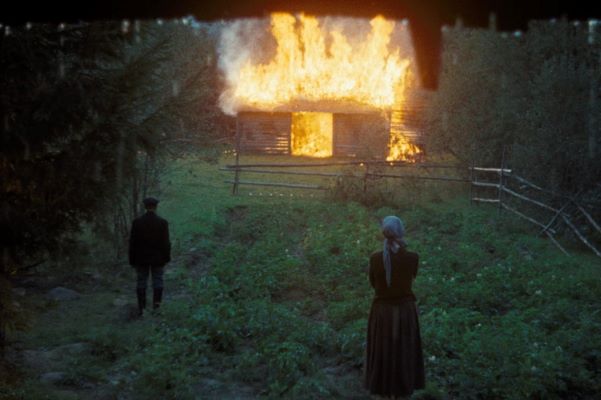Andrei Tarkovsky is one of the filmmakers who came to epitomise arthouse film, yet he defies easy categorisation. Unlike that other go-to art film titan, Ingmar Bergman, he isn’t easily parodied, and as he shifted between genres and themes in an effortlessly protean way over his career it’s hard to define what makes a Tarkovsky film. One indicator we can ascribe however, is quality. Mirror, Tarkovsky’s fourth feature, and his most personal, is among his very best. This wasn’t evident to the Soviet authorities at the time, however. It was released to little fanfare, and has has had to claw its way toward its now universal regard incrementally over the decades. This is partly down to a structure based on modernist literature and classical music rather than standard cinematic techniques. It evades narrative, logic, even time; delivering instead an an intensely beautiful sensory tumble down the rabbit hole of memory.
Mirror drops us into the experiences of the dying Alexei at three points in his life; as a boy (Filipp Yankovsky) in the ’30s, as a teenager (Ignat Daniltsev) during the war, and as a middle-aged man (Innokenty Smoktunovsky) on his deathbed. Yet, arguably Alexei is not the main focus. Instead, Tarkovsky examines the women in Alexei’s life, his mother Maria (Margarita Terekhova) and ex-wife Natalia (also played by Terekhova). Throughout, we hear snatches of poetry read by the celebrated Russian poet Arseny Tarkovsky (Andrei’s father) chosen to evoke the mood of each scene. Jumping between eras and moods at will, Tarkovsky conjures a gossamer ambient patchwork of mood and memory.
The scenes are oblique, even gnomic at times, but poetically evoke the fragmented and unreliable nature of recollection. It’s Joycean in structure, and Proustian in its emotions. Each feels unhurried, meditative, and suffused with melancholy, yet powered with almost transcendent beauty. There is the hypnotic sight of a burning barn, its flames tearing a hole through the crepuscular light, Maria washing her hair as plaster falls from the ceiling, muddy bare feet leaving prints on a floor, Maria levitating above the bed. Some of these are surely dreams. In many, Alexei is not present at all. Are these moments recounted by his mother? Her dreams, or his?
And not all memories have to hold equal weight. Why does Alexei’s mind drift to the moment where he answers a knock at the door to an old woman, only for her to explain she has the wrong address and shuffle off? Is this a tiny detail of a bigger event that he can’t quite get a mental handle on? Or perhaps a subconscious defence mechanism masking something awful and repressed? And what are these little moments where there appears to be a mischievous ghostly presence, an object knocked from a table, the crack of a pane of glass?
Although mysterious, even ineffable in places, Mirror never presents as a puzzle to be solved. Neither is it an examination of the Soviet Union over the decades; Alexei is no metaphor for his fatherland. Describing what it is like as an experience is like sculpting water. It’s obviously autobiographical, and the striking presence of Terekhova in dual roles as mother and wife seems symbolic of a certain circular pattern of lived experience, but one couldn’t necessarily piece together an idea of Tarkovsky as a man from it, other than as a particularly reflective thinker. Unlike other autobiographical works, it also entices the viewer to reflect on their own memories, and sense of self.
While not an easy film, neither does Mirror feel particularly challenging. It may overstate the case to call it accessible, but there is a stately, unhurried rhythm in its editing and poetic narration, if not its storytelling, that compels the viewer to stay with it, even if it knowingly seeks obfuscation rather than clarity. Beyond this, it also contains some of the most stunning imagery from a filmmaker who seemed to be able to conjure an indelible moment at will. A great deal of this is down to cinematographer Georgi Rerberg, who lenses with effortless versatility throughout. It is quite possible one of the most beautiful films ever made, and perhaps arguably the crowning achievement of one the greatest filmmakers ever.
Available on Blu-ray from Mon 26 Jul 2021
